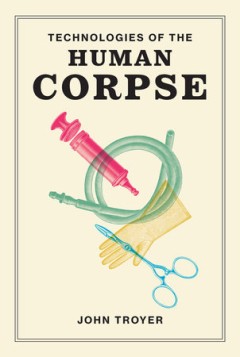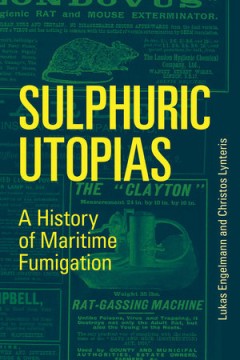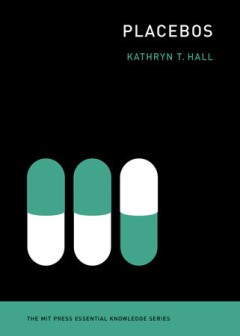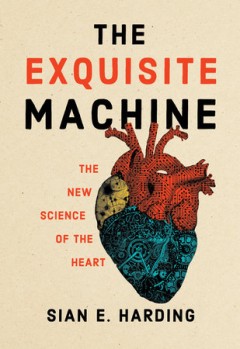Filter by

Technologies of the Human Corpse
The relationship of the dead body with technology through history, from nineteenth-century embalming machines to the death-prevention technologies of today. Death and the dead body have never been more alive in the public imagination—not least because of current debates over modern medical technology that is deployed, it seems, expressly to keep human bodies from dying, blurring the bounda…
- Edition
- -
- ISBN/ISSN
- 9780262358095
- Collation
- -
- Series Title
- -
- Call Number
- -

Sulphuric Utopias: A History of Maritime Fumigation
How early twentieth century fumigation technologies transformed maritime quarantine practices and inspired utopian visions of disease-free global trade. In the late nineteenth and early twentieth centuries, fumigation technologies transformed global practices of maritime quarantine through chemical and engineering innovation. One of these technologies, the widely used Clayton machine, blasted …
- Edition
- -
- ISBN/ISSN
- 9780262358194
- Collation
- -
- Series Title
- -
- Call Number
- -

How Knowledge Grows: The Evolutionary Development of Scientific Practice
An argument that the development of scientific practice and growth of scientific knowledge are governed by Darwin's evolutionary model of descent with modification. Although scientific investigation is influenced by our cognitive and moral failings as well as all of the factors impinging on human life, the historical development of scientific knowledge has trended toward an increasingly accu…
- Edition
- -
- ISBN/ISSN
- 9780262371599
- Collation
- -
- Series Title
- -
- Call Number
- -

Visual Plague: The Emergence of Epidemic Photography
How epidemic photography during a global pandemic of bubonic plague contributed to the development of modern epidemiology and our concept of the “pandemic.” In Visual Plague, Christos Lynteris examines the emergence of epidemic photography during the third plague pandemic (1894–1959), a global pandemic of bubonic plague that led to over twelve million deaths. Unlike medical photography…
- Edition
- -
- ISBN/ISSN
- 9780262370912
- Collation
- -
- Series Title
- -
- Call Number
- -

Imperfection: A Natural History
In praise of imperfection: how life on our planet is a catalog of imperfections, errors, alternatives, and anomalies. In the beginning, there was imperfection, which became the source of all things. Anomalies and asymmetries caused planets to take shape from the bubbling void and sent light into darkness. Life on earth is a catalog of accidents, alternatives, and errors that turned out to wo…
- Edition
- -
- ISBN/ISSN
- 9780262371667
- Collation
- -
- Series Title
- -
- Call Number
- -

Placebos
The biological power of the placebo effect. The power of placebos to ameliorate symptoms has been with us for centuries. Western medicine today is finding it increasingly difficult to ignore the efficacy of placebos. In some clinical trials with placebos as controls, inert or sham replicas of active pharmaceutical drugs and even sham surgeries have been found to be as beneficial as the inter…
- Edition
- -
- ISBN/ISSN
- 9780262371018
- Collation
- -
- Series Title
- -
- Call Number
- -

Drugs and the FDA: Safety, Efficacy, and the Public's Trust
How the FDA was shaped by public health crises and patient advocacy, told against a background of the contentious hearings on the breast cancer drug Avastin. Food and Drug Administration approval for COVID-19 vaccines and the controversial Alzheimer's drug Aduhelm made headlines, but few of us know much about how the agency does its work. Why is the FDA the ultimate US authority on a drug's …
- Edition
- -
- ISBN/ISSN
- 9780262371322
- Collation
- -
- Series Title
- -
- Call Number
- -

Frederik Ruysch and His Thesaurus Anatomicus: A Morbid Guide
A lavishly illustrated guide to the magnum opus of the great seventeenth-century anatomist, master embalmer, artist, and collector of specimens. Frederik Ruysch (1638–1731) was a celebrated Dutch anatomist, master embalmer, and museologist. He is best remembered today for strange tableaux, crafted from fetal skeletons and other human remains, that flicker provocatively at the edges of scie…
- Edition
- -
- ISBN/ISSN
- 9780262366526
- Collation
- -
- Series Title
- -
- Call Number
- -

The Exquisite Machine: The New Science of the Heart
How science is opening up the mysteries of the heart, revealing the poetry in motion within the machine. Your heart is a miracle in motion, a marvel of construction unsurpassed by any human-made creation. It beats 100,000 times every day—if you were to live to 100, that would be more than 3 billion beats across your lifespan. Despite decades of effort in labs all over the world, we have no…
- Edition
- -
- ISBN/ISSN
- 9780262370776
- Collation
- -
- Series Title
- -
- Call Number
- -

The Evolution of Agency: Behavioral Organization from Lizards to Humans
A leading developmental psychologist proposes an evolutionary pathway to human psychological agency. Nature cannot build organisms biologically prepared for every contingency they might possibly encounter. Instead, Nature builds some organisms to function as feedback control systems that pursue goals, make informed behavioral decisions about how best to pursue those goals in the current situ…
- Edition
- -
- ISBN/ISSN
- 9780262370202
- Collation
- -
- Series Title
- -
- Call Number
- -
 Computer Science, Information & General Works
Computer Science, Information & General Works  Philosophy & Psychology
Philosophy & Psychology  Religion
Religion  Social Sciences
Social Sciences  Language
Language  Pure Science
Pure Science  Applied Sciences
Applied Sciences  Art & Recreation
Art & Recreation  Literature
Literature  History & Geography
History & Geography